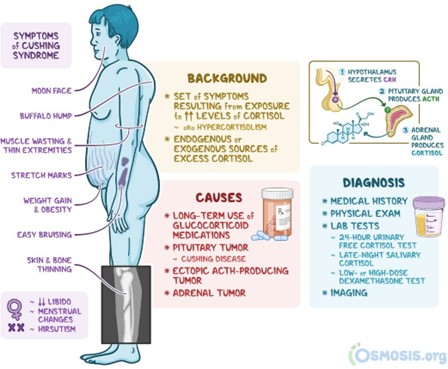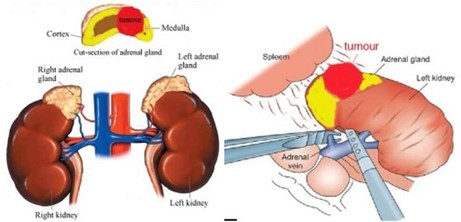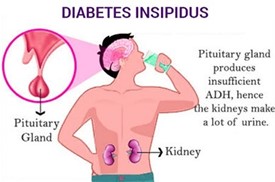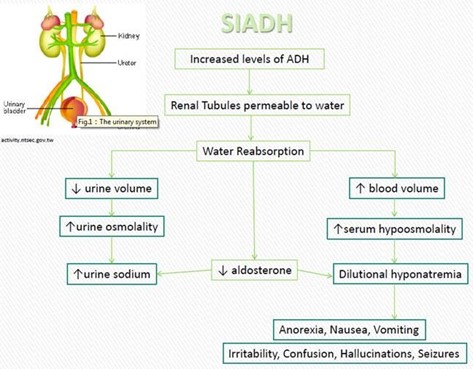A patient with crushing syndrome is admited to the hospital to have laparoscopic adrenalectomy. During the admission assessment, the patient tells the nurse "The worst thing about this disease is how terrible I look; I feel awful about it.' The best response by the nurse is:
You really should not worry about how you look in the hospital, we see many worse things.
Most of the physical and mental changes caused by the disease will gradually improve after surgery.
"Let me show you how to dress so that the changes are not so noticeable."
"I do not think you look bad; your appearance is just altered by your disease.
The Correct Answer is B
This response acknowledges the patient's concerns and provides reassurance that the changes are temporary and will improve after surgery. Response is dismissive of the patient's concerns and may make the patient feel unheard. Response c may be helpful, but it does not address the patient's emotional concerns. Response d is not accurate because the patient has expressed feeling awful about their appearance.


Nursing Test Bank
Naxlex Comprehensive Predictor Exams
Related Questions
Correct Answer is B
Explanation
Diabetes insipidus is a condition where the body is not able to regulate water balance properly, leading to excessive urine output and dehydration. The patient's urine output of 800 ml/hr (option A) and low urine specific gravity of 1.003 (option C) is consistent with diabetes insipidus and requires monitoring, but they are not as immediately concerning as the patient's confusion and lethargy.
Confusion and lethargy may indicate severe dehydration, electrolyte imbalances, or even brain swelling (if the patient had a recent head injury, as mentioned in option D). These symptoms require immediate attention to prevent further complications and ensure the patient's safety.

Correct Answer is C
Explanation
The correct answer is c. I will eat foods high in potassium because the diuretics cause potassium loss.
Rationale for Choice A:
- Statement:"I should weigh myself daily and report any sudden weight loss or gain."
- Rationale:This statement is correct.It's crucial for patients with SIADH to monitor their weight daily as even slight fluctuations can signal fluid imbalances.Sudden weight gain can indicate fluid retention,while sudden weight loss might suggest dehydration.Both scenarios warrant medical attention.
Rationale for Choice B:
- Statement:"I need to limit my fluid intake to no more than 1 quart of liquids a day."
- Rationale:This statement is also correct.Fluid restriction is a cornerstone of SIADH management.By limiting fluid intake,patients can help prevent the buildup of excess fluid in the body,which can lead to complications such as hyponatremia (low sodium levels in the blood) and edema.
Rationale for Choice C:
- Statement:"I will eat foods high in potassium because the diuretics cause potassium loss."
- Rationale:This statement is incorrect.While some diuretics used in the treatment of SIADH can indeed cause potassium loss,this is not a universal side effect.Furthermore,increasing potassium intake without medical supervision can be dangerous,potentially leading to hyperkalemia (high potassium levels in the blood).It's essential for patients to consult with their healthcare providers for individualized guidance on potassium intake.
Rationale for Choice D:
- Statement:"I need to shop for foods that are low in sodium and avoid adding salt to foods."
- Rationale:This statement is correct.A low-sodium diet is often recommended for patients with SIADH to help manage fluid balance and prevent hyponatremia.Restricting sodium intake can reduce fluid retention and help maintain appropriate sodium levels in the blood.

Whether you are a student looking to ace your exams or a practicing nurse seeking to enhance your expertise , our nursing education contents will empower you with the confidence and competence to make a difference in the lives of patients and become a respected leader in the healthcare field.
Visit Naxlex, invest in your future and unlock endless possibilities with our unparalleled nursing education contents today
Report Wrong Answer on the Current Question
Do you disagree with the answer? If yes, what is your expected answer? Explain.
Kindly be descriptive with the issue you are facing.
